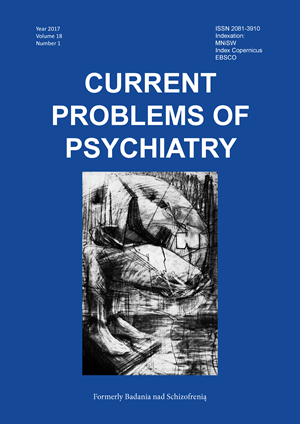Assessment of the need for information about planned gynecologic surgery
DOI:
https://doi.org/10.1515/cpp-2017-0004Keywords:
gynecological surgery, need for information, anxietyAbstract
The objective of the study was to assess the level of patients' need for information about the planned gynecologic surgery.
Material and Methods. The number of 173 patients preparing to undergo planned gynecological procedure were qualified for the study. The participation in the survey was entirely voluntary. Each patient was asked to fulfill the survey conducted using the Amsterdam Preoperative Anxiety and Information Scale-APAIS that enables the estimation of the patient’s need for surgery-related information. Furthermore patients’ clinical and demographic data was collected. Results were analyzed using appropriate statistical tools: the Shapiro-Wilk W-test (for distribution of the studied parameters) and the Mann-Whitney U-test (for comparing two independent groups). P value less than 0.05 was considered statistically significant.
Results. It was shown that premenopausal women have a greater need for information about the planned surgery than postmenopausal patients (p<0.05). Patients, who have never been operated, displayed a significantly greater need (p=0.04) for information about their planned surgery in relation to women who have already undergone surgery. The patient’s age, the phase of the menstrual cycle, the education level, the marital status, as well as the preoperative diagnosis and the type of the planned surgery did not affect the level of the preoperative information requirement (p>0.05).
Conclusions. The high level of the need for information about the planned surgery characterizes premenopausal patients and those operated for the first time.
References
1. Moerman N, van Dam FS, Muller MJ, Oosting H. The Amsterdam Preoperative Anxiety and Information Scale (APAIS). Anesth Analg 1996;82:445-451.
2. Ali A, Altun D, Oguz BH, Ilhan M, Demircan F, Koltka K. The effect of preoperative anxiety on postoperative analgesia and anesthesia recovery in patients undergoing laparoscopic cholecystectomy. J Anesth 2014;28:222-227.
3. Pużyński S. Psychiatria Kliniczna. Wrocław; Elsevier Urban & Partner: 2011.
4. Arabul M, Kandemır A, Çelık M, Alper E, Akpinar Z, Aslan F, et al. Impact of an information video before colonoscopy on patient satisfaction and anxiety. Turk J Gastroenterol 2012; 23:523-529.
5. Carr E, Brockbank K, Allen S, Strike P. Patterns and frequency of anxiety in women undergoing gynaecological surgery. J Clin Nurs 2006;15:341-352.
6. Sjoling M, Nordahl G, Olofsson N, Aspluidn K. The impact of preoperative information of state anxiety, postoperative pain and satisfaction with pain management. Patient Educ Counsel 2003;51:169-176.
7. Thyer BA, Papsdorf JD, Davis R, Vallecorsa S. Autonomic correlates of the subjective anxiety scale. J Behav Ther Exp Psychiatry 1984;15:3-7.
Downloads
Published
Issue
Section
License
Copyright (c) 2017 Authors

This work is licensed under a Creative Commons Attribution-NonCommercial-NoDerivatives 3.0 Unported License.


